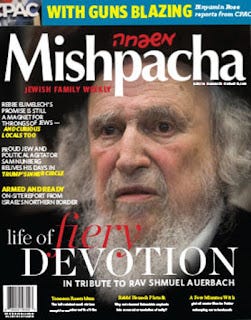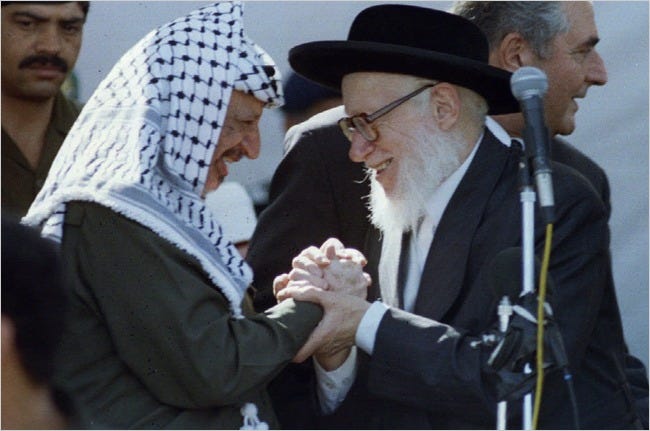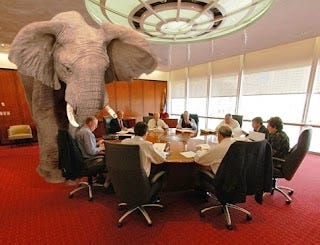The Elephant in the Room
To what extent are violent extremists to be considered a particularly charedi problem? This has become an increasingly important question over the last few years. A few years ago, a certain Rav, with whom I used to be close until he went from being moderate-charedi to hardline right, argued that charedim have no responsibility to take a stand against violent extremists because such people have nothing to do with the rest of charedi society. I wrote a post in which I argued that there is a continuous spectrum ranging from physical violence to verbal abuse towards the IDF which exists throughout the charedi world. Furthermore, while the people at each level do not agree with the level of hostility coming from people to their right, there is near-constant refusal to condemn it. And even people who are horrified by the violence nonetheless produce inflamed rhetoric which creates an atmosphere that allows it and contributes to it.

Most recently, this question, regarding to what extent are violent extremists to be considered a particularly charedi problem, came to the forefront of discussion with the Peleg faction, headed by Rav Shmuel Auerbach, who passed away last Shabbos. A few months ago, they held a "Day of Rage," shutting down parts of Israel with demonstrations in response to some yeshiva dropouts being arrested for evading army service. And there have been many riots and acts of violence by Peleg people. (There are some people who claim that Rav Shmuel had absolutely no knowledge of such things and would certainly not have approved of them, but this seems rather naive.)
At the time, there was a dispute about to the extent to which Rav Auerbach and Peleg can be considered part of charedi society. On the one hand, Rabbi Avraham Edelstein, director of Ner LeElef, claimed that Peleg should not even be called Orthodox, let alone charedi. But on the other hand, as I pointed out in a post on the topic, the mainstream chareidi media, which is ready to call out Open Orthodoxy on their extremism, was not willing to criticize Pele for theirs. And Rav Yitzchak Berkovitz, of the extremely moderate Jerusalem kollel, gave a talk in which he justified Peleg's approach as based on a legitimate dispute as to whether the government of Israel can be perceived as waging a War on Torah.
The Rosh Yeshivah of a certain Jerusalem middle-of-the-road yeshivah told me that he felt that Rav Berkovitz was out of touch with mainstream charedi society, which, he said, considers Rav Shmuel to be completely beyond the pale. But, in light of how Rav Shmuel's passing has been received in the charedi world, I am not so sure.
A nice person that I know wrote that Rav Shmuel was a great Torah scholar, who was entirely leshem Shamayim in his actions, and thus we should mourn the passing of a great man. I find this to be lacking (and reflective of the naive common fallacy that someone who is a great Talmudist is necessarily also a great tzaddik and a great leader).

Having known Rav Shmuel as my neighbor over many years (he even wrote a michtav bracha for my first book!), I agree that he was a great Talmudist and 100% leshem Shamayim in his actions. He was not remotely interested in wealth or power or any kind of personal benefit. But so what? Rabbi Moshe Hirsch (pictured here) was also a great Torah scholar who was 100% leshem Shamayim. Being a great Talmudist or a great Torah scholar does not mean that one does not do terrible things. And there are many people in the world who do very terrible things entirely leshem Shamayim. The road to hell is paved with good intentions. A person is judged by his actions, not by his intentions.
So how did charedi society judge his actions? On the one hand, it was reported that Rav Chaim Kanievsky--who reportedly once referred to Rav Shmuel as a zaken mamre - received the news of his passing with silence, rather than with an expression of sorrow.
But on the other hand, this week's Mishpacha magazine has Rav Shmuel on the cover as its feature story! (And so does Ami magazine, but all reasonable people have long given up on a magazine that once photoshopped swastikas onto the White House for its cover story about Obama, and defends pedophiles, amidst other lunacy.)

The article is full of praise for Rav Shmuel, and mentions nothing at all about the extremely significant actions of the last decade of his life. It seems absurd for Mishpacha to ignore the elephant in the room. How can they not make any sort of statement, either for or against? Can't they even have a single sentence saying that Rav Shmuel started a new political movement which took a hardline, activist approach and which was strongly opposed by the other charedi Litvishe gedolim?
But I realized that by not making any statement, they are in fact making a statement: That while they do not approve of his holy war against the State, they do not consider that this puts him beyond the pale, or that it even demotes him from the pantheon of Great Torah Leaders. Unlike, say, Rav Aharon Lichtenstein ztz"l, who was not featured on the cover of Mishpacha after his passing.
The boundaries and values of mainstream chareidi society, as reflected by Mishpacha magazine (which is actually somewhat left of mainstream in the charedi world), seem fairly clear. You can be a convicted felon and be featured on the cover as a hero. You can launch a civil war in Israel and be praised as a fiery Torah leader. Just don't be a Zionist, and don't express your belief in an age of dinosaurs!


